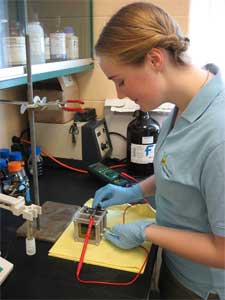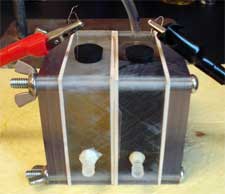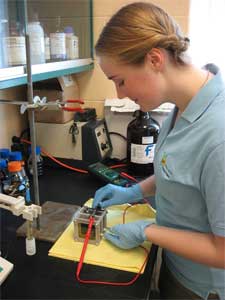 KINGSTON, R.I. – September 14, 2009 – Two University of Rhode Island students spent the summer building a unique fuel cell that uses bacteria and the waste stream from the production of biodiesel to generate renewable energy.
KINGSTON, R.I. – September 14, 2009 – Two University of Rhode Island students spent the summer building a unique fuel cell that uses bacteria and the waste stream from the production of biodiesel to generate renewable energy.
Chemical engineering students Sarah Hanselman of Bangor, Maine, and Patricia Coutts of Hyde Park, N.Y., collaborated with Professor Stanley Barnett to develop this new form of green energy.
According to the students, there is a growing need to convert the waste stream from the process of making biodiesel – 90 percent of which is glycerol – into other valuable products. So they built a small fuel cell using the biodiesel waste products as the fuel. When they added bacteria to the biodiesel waste, the microorganism oxidized the fuel through an electrode to generate electricity.
“In addition to making electricity, we hope that the fuel cell will convert the glycerol into other potentially valuable chemical products that can be used in all sorts of chemical processes and consumer products like shampoo and make-up,” said Hanselman. “If it can work on a larger scale, this could be a win-win situation – it gets rid of biodiesel waste and we get electricity out of it.”
The first microbial fuel cell the students built was not efficient enough to generate useful quantities of electricity. They are continuing to make refinements to the design and materials to decrease internal resistance and increase voltage.
“We’re also exploring using different types of electrodes and different alloys of metals to see which might help us get more voltage,” Coutts said.
The students hope that their fuel cell will eventually generate enough electricity to power a small fan or other household appliance.
Barnett, the students’ advisor, is encouraging the students to pursue other research projects to develop unique renewable energy sources as a means of reducing the use of fossil fuels. One such project involves extracting a naturally produced oil from algae.
“Hopefully we’ll be able to use that oil in a fuel cell,” Coutts said. “It would be awesome if a household could grow their own algae, put it in a fuel cell and get energy to power their appliances. Algae grows fast, it can be grown in ponds almost anywhere, and it would get us away from the costly biodiesel production and separation process.”
 Coutts and Hanselman are both enrolled in the URI International Engineering Program and will be spending part of the next year studying and working abroad. Coutts will study at the Technical University of Braunschweig in Germany, followed – she hopes – by an internship at Schott AG, a glass and ceramics manufacturer in Mainz, Germany. Hanselman will take classes at the Technical University of Compiegne in France and intern for an as-yet undetermined company.
Coutts and Hanselman are both enrolled in the URI International Engineering Program and will be spending part of the next year studying and working abroad. Coutts will study at the Technical University of Braunschweig in Germany, followed – she hopes – by an internship at Schott AG, a glass and ceramics manufacturer in Mainz, Germany. Hanselman will take classes at the Technical University of Compiegne in France and intern for an as-yet undetermined company.
Both students expect to follow up their URI education with graduate school, though they are leaving their options open to whatever other opportunities may arise from their research or their time abroad.

